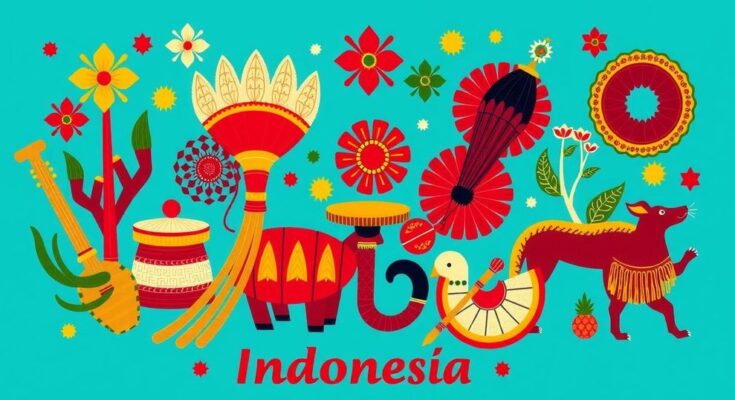Indonesia is facing unrest through student protests following President Prabowo Subianto’s inauguration. Lara Bevan-Shiraz reports on national tensions and interviews Allesandro Bernama from the Indonesian Embassy. An exploration of Indonesia’s cultural diversity, democracy, and foreign relations highlights the complexities of governance amid public dissatisfaction and historical traumas.
Indonesia is currently experiencing significant student protests, 150 days after President Prabowo Subianto’s inauguration. Political journalist Lara Bevan-Shiraz analyzes the protests’ national and international implications, including insights from Allesandro Bernama, Head of Political Affairs at the Indonesian Embassy in London. As a prominent member of BRICS and an emerging moderate Islamic nation, Indonesia faces both opportunities and challenges in its development journey.
Returning to governance under President Prabowo, who has a controversial history linked to human rights allegations, the administration is grappling with the complexities of youth discontent. Prabowo gained a significant share of the youth vote through energetic social media campaigns, but despite high popularity ratings, challenges such as policy implementation and government budget cuts have sparked unrest among the younger population who played a vital role in shaping Indonesian history.
Bernama emphasizes Indonesia’s rich cultural diversity, referencing the nation’s motto “Bhinneka Tunggal Ika” (Unity in Diversity). With a vast archipelago home to extensive ethnic groups, the country celebrates its democratic evolution, exhibiting notable voter turnout and representation. The establishment of a progressive government, featuring 22% female MPs, signifies a commitment to fostering a more inclusive political landscape.
He notes Indonesia’s foreign policy aligns with historical non-alignment principles, promoting a proactive role on the world stage through various international organizations. The nation advocates for peace through international cooperation, evidenced by Indonesia’s significant contributions to UN peacekeeping forces and ongoing support for Palestinian humanitarian initiatives.
Addressing the sensitive topic of the Genocide Convention, Bernama acknowledges Indonesia’s complex historical traumas, including the anti-Communist massacres and East Timor events. He highlights the government’s current dedication to human rights improvement, emphasizing the establishment of a new Ministry of Human Rights as a significant step toward reconciliation and accountability.
In the context of the ongoing protests, Bernama asserts that such civic engagement is indicative of a healthy democracy. He interprets the public’s willingness to communicate grievances as a necessary mechanism for governmental accountability. The administration’s responsiveness to protests signals potential adjustments to policies that previously raised concern among the populace.
Looking internationally, Bernama regards the United Kingdom as a natural partner for Indonesia, further solidified by recent collaborative agreements. The embassy plans to showcase Indonesian culture through various events in the UK, including participation in notable festivals and traditional celebrations, to promote cross-cultural understanding and cooperation.
In concluding, the situation in Indonesia reflects a multifaceted landscape of hope, challenge, and the potential for future growth. While student protests indicate significant discontent, they also represents a vibrant democratic spirit. Indonesia’s commitment to enhancing human rights and fostering international relations demonstrates its pursuit of resilience and unity amid internal and external pressures.
In summary, Indonesia’s political landscape under President Prabowo Subianto is currently marked by student protests reflecting deep societal concerns. Despite Prabowo’s significant initial support, challenges related to policy implementation and financial management have surfaced. The government’s commitment to promoting human rights and engaging in international partnerships with countries like the UK indicates a path forward. These dynamics illustrate Indonesia’s ongoing struggle to balance its diverse sociopolitical fabric with its aspirations for democratic governance and global prominence.
Original Source: roarnews.co.uk




